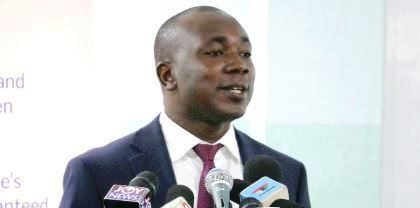“If you are in doubt about the fundamentals of the economy, check the exchange rate,” Godfred Alufar Bokpin, a Professor of Economics and Finance at the University of Ghana Business School (UGBS), has reemphasised.
The Professors says the strength of the local currency on the forex market determines how strong or weak an economy is, adding that the value of the cedi currently, is an indication of an ailing economy.
According to Prof. Bokpin, although Ghana gets all the revenue it requires through the levies it charges on citizens and businesses, it is expensed inefficiently, hampering the economic growth and development in the process.
The finance expert says available data shows that Ghana’s tax to Gross Domestic Product (GDP) has no much difference when compared to other developed nations. However, because the taxes are not put to proper use, they don’t impact the nation in any way.
The Professor was speaking on Ghana’s ailing economy and its depreciated cedi on the KeyPoints on TV3 Saturday, June 22, 2024, when he made the comments, bemoaning the higher taxes the government has placed on individuals and businesses in its attempt to solve the economic quagmire the nation finds itself in.
He has cautioned that until the inefficient expenditure is abated, Ghana should forget about development.
Prof. Bokpin cited the over US$200 million that has been sunk into the affordable housing project in the country with reptiles and rodents now occupying the spaces, advising that “if you continue with such level of corruption, expenditure inefficiencies, you’ll be unique to expect a different outcome. You can even tax the air that we breathe, the development will not come. If we continue along this path and suddenly we expect that the cedi alone will do the magic, [it will not work].
Reiterating a popular quote made by the Vice President, Dr. Mahamudu Bawumia in 2016, the UGBS Professor noted that: “The foreign exchange market is the pulse of the nation so if the economy is doing well and all that, the first level evidence is to see what’s happening to your currency and that’s why we say in Economics that, if you are in doubt about the fundamentals of the economy, check the exchange rate.”
Economists and financial experts have warned that the cedi will be depreciating further and may likely hit the GHC20 mark by December considering the depreciation trajectory.
The Minority in Parliament has equally raised concerns expressing similar sentiments to that of those shared by the experts and analysts.
The cedi now trades at over a GHC15 to the dollar, with businessmen channeling the added costs onto consumers, leading to high cost of living.
Business owners have complained over how the cedi is affecting their merchandise, leaving many of them distressed.
The debts owed by some of these businesses have ballooned over the period, whilst some have been forced to shut down.
The Food and Beverages Association of Ghana (FBAG), has, for instance, highlighted that the prevalent business model of selling on credit has exacerbated the problem, as importers struggle to repay their debts.
Stop blaming COVID-19 for cedi’s woes – Joe Jackson to politicians












